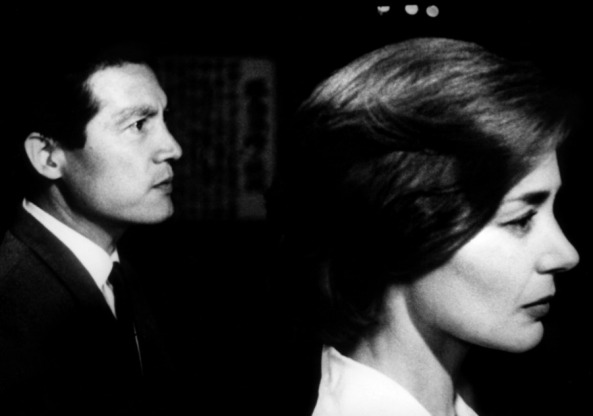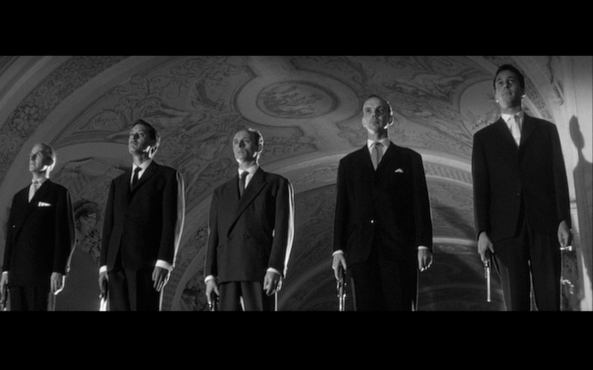The Marienbad Game is a short, two player card game in which cards, or match sticks if you prefer, are dealt in rows of 1, 3, 5 and 7. Players can pick up any number they wish in a turn so long as they draw from the same row. The person forced to pick up the last card loses. The rules matter not, because “Last Year at Marienbad’s” “M” (Sacha Pitoeff) always wins. The film’s patrons speculate and strategize fruitlessly, because the brain teaser seems to have no obvious answer.
Neither does the movie, and Director Alain Resnais, who was still making films but passed away in March, would laugh at the idea that a film or work of art needs to be scrutinized and solved (see: Christopher Nolan, J.J. Abrams, Joss Whedon). “Last Year at Marienbad” resists interpretation.
The film is about a man seducing a woman at a luxurious hotel by trying to convince her they’ve met a year before. He tells an elaborate story rife with details and she plays along while continuing to deny any recollection of their meeting. That description makes it sound like a romantic comedy, but the movie is a gloomy, sprawling and sumptuous fantasy. It’s also a polarizing, yet hypnotic dream of a movie that meanders and blares endlessly.
“Last Year at Marienbad,” along with “Hiroshima Mon Amour” just before it, catapulted Resnais into the world stage with a pair of Oscar nominations and a spot in the echelon of the French New Wave masters. But while Godard and Truffaut’s early films dredged up reality and the streets, Resnais took the surreal route and made films that were a giant leap from his documentary roots.
In one way, they’re slogs of films to watch. In “Marienbad,” a pipe organ bounces frenetically and urgently as though someone has rearranged the sheet music. Resnais edits sporadically, the camera floats and swivels at all heights, and at the film’s open he takes time to admire the ornamentation on the ceiling as a mantra repetitiously drones. The style resembles the chamber drama of “The Exterminating Angel” blended with the fourth wall breaking images of “Persona.”
“Hiroshima, mon amour” is similar in presentation. The story involves an actress (Emmanuelle Riva) having an affair with a Japanese man (Eiji Okada) while working on a movie in Hiroshima. They reflect on her dark past with a former lover, they discuss morals, madness and hatred, and all of it is spliced with war-torn footage of Hiroshima after the bombing. It’s loosely political, but it is so dreamy and hypnotic in much the same was “Marienbad” that it too may not be about anything at all.
“Hiroshima” does give us a little more to go on by its twist ending conjuring symbolism of the lingering threads between Hiroshima and Europe post-war. It reveals itself as a movie about memory, forgetting your memories, indifference to them and fear of losing it. And yet we get lost in the romance and steamy pillow talk in “Hiroshima” rather than her complex backstory or the simple ideas against armament.
In the same way, “Marienbad” is even more abstract, but the fact that these images have no right answer add to the mystique, fantasy and seduction of it all. There’s juicy intensity as Resnais shows us a canted angle firing squad, rows of blank faces in a trance or in M’s (Sacha Pitoeff) pensive scowl. The film hypnotic not just because of Resnais’s style but because he constantly keeps the film dancing and the audience guessing. It’s at once harried and intense while being gloomy, methodic and trancelike.
Both of these films are exotic art films that polarize more than they invite, but they don’t require a large barrier to entry to get caught in their spell. “You were bored in a way that makes a man want to know a woman,” says the one lover in “Hiroshima.” These films have a cold facade but we want to get to know them and embrace the mystery they hold.

